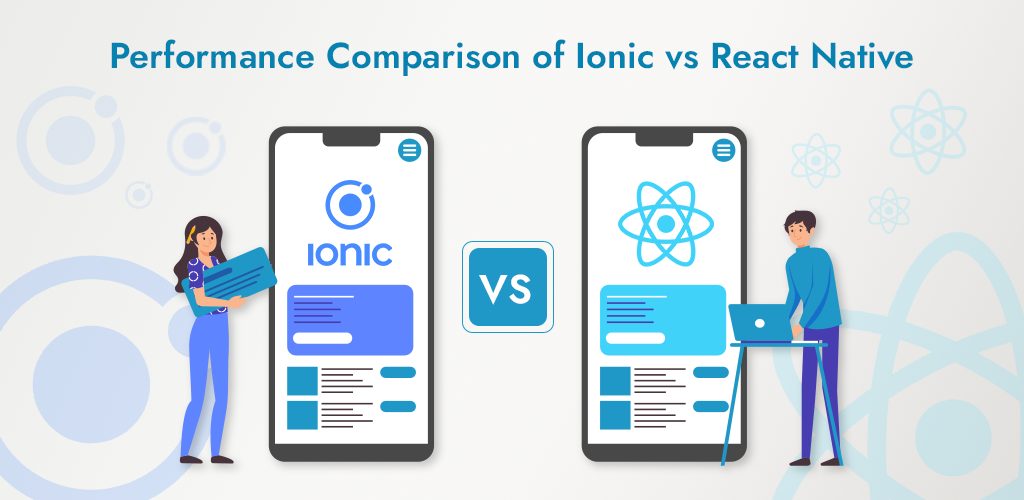
In this technological era, everyone is urged to be updated with relevant information and data at their fingertip. Many companies are shifting from desktops web to intuitive and full-featured mobile applications. Ionic vs React Native are the two best frameworks for developing hybrid mobile applications. Ionic is a complete open-source SDK whereas React Native is a cross-platform solution. React Native market share is 4.67%, while Ionic market share is 3.72%. React Native is Native whereas Ionic is a Hybrid.
Well, for building specific platforms one certain technology is used. Is that it is not as simple or easy as it seems to be to develop a cross-platform app. And it is no more a secret that both Ionic vs React Native is in contend against each other for cross-platform application development. The future of your project solely depends on the frameworks you choose. Ionic helps you to use HTML/CSS/JS to develop iOS apps. React Native utilizes JS Framework React. Ionic leverages web technologies to deliver its applications. React Native uses JavaScript (JS). Both platforms develop real native apps that give full access to native using plugins and customize native code.
Let’s First Understand What is Ionic vs React Native.
IONIC:

Ionic is based on the HTML5 programming language which is a mobile app development framework. Ionic needs both Cordova and PhoneGap for its working. It works on iOS UI WebView or Android WebView. It uses Typescript code language. It comprises more pre-developed and pre-styled components. The best part is it needs to be written once but it can be executed anywhere thus making the development easy. It has easy coding which allows re-using codes and code testing can be done on any browser.
REACT NATIVE:

React native is managed by expert React Native developers and corporations such as Facebook and Instagram. The feature that attracts is that the developers can reuse the code already used for Android or iOS apps. It is JavaScript used to develop UI. It uses JSX coding language. It has very few already developed components. It is easy to learn and thus writing on any platform becomes easy. It allows reusing code to develop Android, iOS, and Windows phone apps.
Now which one to use out of both of them is always a question raised while developing an app. Well, both are poles apart from each other in their ways and both have differences. If you want speedy development of apps then opting for React Native is the best option.
BOOT TIME

Boot time is a crucial aspect that is a measuring stick to know how much time an application takes to load. There are two types of boot time: Cold Boot Time and Warm Boot Time. Both React Native and Ionic take around 1.5 seconds for cold boot times. Whereas, it takes around 1 second for warm boot time. With a slight edge React Native wins the battle when it comes to boot time compared to Ionic. Though React Native is faster, so is the case with Ionic.
MOBILE APP FRAMEWORK

Both Ionic vs React Native are efficient for your mobile app frameworks. But both have their individual properties that can develop your desired mobile apps accordingly. Both help you build hybrid mobile apps but they both use different web technologies and frameworks. Ionic uses web technologies such as Javascript and HTML and frameworks like React, Vue, and Angular. On the other hand, React Native uses React framework and Javascript. You can select either one and end up using a single codebase written in one language that configures into cross-platform mobile apps.
WEB-NATIVE APPLICATIONS

Cross-platform mobile apps can be built using two crucial React: Ionic React and React Native. Both of them have their individual properties, goals, features, and proficiencies. It’s therefore, necessary to have the complete discernment of the two and then plan to invest in one. Ionic React just like traditional React web app development gives an easy and speedy development experience. React Native does not use traditional web development methodology directly but does have some custom support.
CROSS-PLATFORM DEVELOPMENT
Ionic React supports iOS, Android, Electron, and the web that uses Progressive Web App Technology. On the other hand, React Native is a UI library that officially supports iOS and Android apps. Ionic React enables full customizability to developers whereas using React Native requires developers to design individual-specific screens for each platform. Ionic React and React Native both implement JavaScript at runtime. However, Ionic React gives access to advanced Just In Time compilation for JavaScript, unlike React Native.
IONIC vs REACT NATIVE 2022:
- Considering the technology stack Ionic is far more flexible in comparison to React Native.
- React Native wins the battle when it comes to performance benchmarks as it needs some plugins to use Native features. On the other hand, Ionic cannot be used to build native apps as its features consist of building a hybrid mobile app.
- When it comes to popularity Ionic has 238+ versions released and 41k Github stars while React Native has 346+ versions that were released with 89.1k Github stars.
- If you want to develop your apps on a minimal budget then Ionic is a better option for you.
Well, it is ethically wrong to say which is better. But every decision taken by you for developing an app solely depends on the kind of project you undertake.



